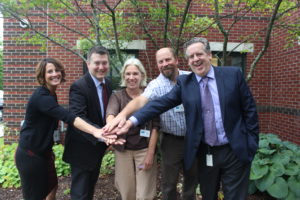Innovative Program with Help from Federal Grant
The Vermont Department of Mental Health (VDMH) has been awarded $9.9 million dollars in a federal grant from Substance Abuse and Mental Health Services Administration (SAMHSA), a branch of the U.S. Department of Health and Human Services. Northwestern Counseling & Support Services (NCSS) and Northern Tier Center for Health (NOTCH) are two of four recipients in the state to receive the funds as part of the Vermont Family Centered Healthcare Home Project (VFCHP), a care delivery system that supports coordination and service delivery between Vermont’s community mental health centers and Federally Qualified Health Centers (FQHC). The program will begin in two regions of the state and expand to two other regions in the third year.
The other two grant recipients to receive these funds, disbursed over a five-year period, are Windham and Windsor Counties at Health Care and Rehabilitation Services (HCRS) and Springfield Medical Care Systems (SMCS).
VFCHP is a unique program, as it will provide a care delivery system that addresses the physical and social support needs of youth who are at risk or have been diagnosed with severe emotional disturbance (SED) and their families. SED may limit a child’s function within their family unit, in school, or in the community as a whole; involving the family unit in the youth’s plan of care offers a stronger base for resiliency and overall improvement across all environments in a child’s life. Families will be engaged in the process of their own healthcare with increased knowledge, clear expectations, and understanding of options, risks and benefits. Regular care plan meetings will occur for families and practitioners to work together around addressing social determinants of health, decision making, and implementation of services.

From left to right: Danielle Lindley-Mitchell, NCSS director of Children, Youth & Family Services; Todd Bauman, NCSS executive director; Pam Parsons, NOTCH executive director; Matt Tryhorne, NOTCH clinical director; Stephen Broer, NCSS director of Behavioral Health Services
The doctor’s office is not always the most appropriate environment to address the concerns of a child or caregiver. The mission of VFCHP is to provide a safe and accessible program for children in a manner that works for them and their families. The new positions created by this grant will allow for innovative and personalized approaches for families: A Well Child Visit Nurse embedded directly within NOTCH; Pediatric Social Workers available for consultation, screening, and referrals; Parent Educator/Health Coaches who will promote health and wellness at home in the community; and Specialty Services Providers who will deliver services in the best setting, whether that be the doctor’s office, within the school, home, or community. “This family centered approach to health care will help individuals to stay well and promote family and community health,” says Todd Bauman, executive director of NCSS.
In VFCHP, there will be an emphasis on improving family nutritional practices, as well as tracking immunizations, Body Mass Index (BMI), tobacco use and exposure to secondhand smoke, oral health and scheduled wellness visits. Addressing these health issues from all corners means a more structured system, and an increased number of children and adolescents screened, referred and accessing services.
Often our physical health and mental health are separated both in theory and location; in VFCHP’s bidirectional integrated care delivery model, physical and mental health are addressed together, across environments. It makes sense to approach healthcare in this way; many staff from NCSS will be spending time with individuals outside of the office in environments that primary care physicians may never explore. Mental health providers can seek to understand why individuals behave and act the way they do; this includes the lifestyle choices, sleep, and exercise, all of which contribute to overall wellbeing.
NCSS and NOTCH have been integrated for years—wellness counselors and social workers are embedded in NOTCH medical homes to provide on-site, integrated care—and this grant will allow for a deepening of the partnership and an overall benefit to the communities served. “The dynamic partnership between NCSS and NOTCH has allowed healthcare to evolve, incorporating medical, mental, and dental care into a seamless continuum of health,” says Matt Tryhorne, NOTCH clinical director. “These grant funds will allow our organizations to apply everything we have learned to the children and families we serve.”
Bauman says this grant “provides NOTCH and NCSS with the resources necessary to improve care and treatment for children and their families.” The Vermont Department of Health estimates that there are at least 12,000 children who have SED or at risk of SED, yet the percentage of these youths accessing mental health treatment is low. In our area, there are approximately 2,100 school-age children who meet criteria for SED.
Like in many programs, therein lies a larger question: how can you tell if anyone is better off? One way providers in VFCHP will track progress is by focusing on caregiver strength scores and a child’s resiliency scores on the Child and Adolescent Needs and Strengths assessment (CANS). The caregiver strength score looks at a caregiver’s confidence in their ability to seek support and solve problems related to parenting their child with SED. In this case, resilience means identifying and using internal strengths in managing one’s life. “Research has shown that resiliency has a significant mitigating effect on traumatic life stressors,” says Alison Krompf, Quality Manager at NCSS. “If a child is able to build resiliency, build internal strength, the likelihood of them graduating from services is much higher. Resiliency is an enormous protective factor that lasts a lifetime; it’s the definition of prevention.”
Pam Parsons, executive director of NOTCH says, “Together, we will develop a program through prevention and early intervention that will improve quality of life for children and families we serve.”
Written by Meredith Vaughn
 Skip to Content
Skip to Content

Comments: